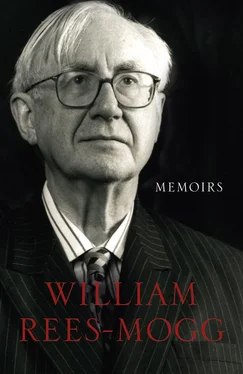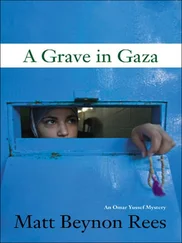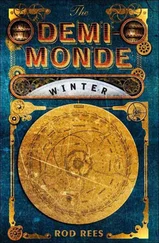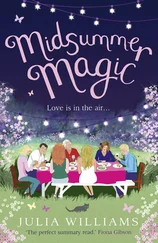WILLIAM REES-MOGG
Memoirs
Contents
Cover
Title Page WILLIAM REES-MOGG Memoirs
List of Illustrations
Foreword
Chapter One - The Young Actress
Chapter Two - The Young Officer
Chapter Three - A House Built on a Hill
Chapter Four - A Peak in Darien
Chapter Five - But we’ll do more, Sempronius
Chapter Six - Everyone Wants to Be Attorney General
Chapter Seven - ‘A University Extension Course’
Chapter Eight - Thank you very much for … the Sunday Times
Chapter Nine - Sadat’s Viennese Ideal
Chapter Ten - Rivers of Blood
Chapter Eleven - ‘The future of Europe is not a matter of the price of butter’
Chapter Twelve - Palladio on Mendip
Chapter Thirteen - The Times ’ Lost Year
Chapter Fourteen - My Life as a Quangocrat
Chapter Fifteen - The Best of Business
Chapter Sixteen - My Road to Bibliomania
Chapter Seventeen - R. v Secretary of State for Foreign and Commonwealth Affairs, ex parte Rees-Mogg
Chapter Eighteen - ‘ An Humbler Heaven ’
Index
Acknowledgements
Picture Section
Copyright
About the Publisher Конец ознакомительного фрагмента. Текст предоставлен ООО «ЛитРес». Прочитайте эту книгу целиком, купив полную легальную версию на ЛитРес. Безопасно оплатить книгу можно банковской картой Visa, MasterCard, Maestro, со счета мобильного телефона, с платежного терминала, в салоне МТС или Связной, через PayPal, WebMoney, Яндекс.Деньги, QIWI Кошелек, бонусными картами или другим удобным Вам способом.
List of Illustrations
William, c. 1936 (Private Collection)
Cholwell, 1936 (Private Collection)
Fletcher, Beatrice, Aunty Molly, William and Andy, 1936 (Private Collection)
William, c. 1946 (Private Collection)
William as President of the Oxford Union, 1951 (Private Collection)
William reading the Evening Standard (Photograph by Otto Karminski © Times Newspapers)
The Rees-Mogg family at Ston Easton (Photograph by Anne Rees-Mogg)
Iverach McDonald being presented with a salver by William, 1973 (© Times Newspapers)
Roy Jenkins and William, 1978 (Private Collection)
Harold Wilson, William and Marcia Williams, 1963 (Photograph by Kelvin Brodie © Times Newspapers)
William addressing editorial staff, 1980 (Photograph by Bill Warhurst © Times Newspapers)
Press conference in London to announce the sale of the Times Newspapers Ltd to Rupert Murdoch (© Times Newspapers)
William with Margaret Thatcher, 1999 (Private Collection)
Pope John Paul II and William (Private Collection)
William with Alfonoso de Zulueta and Shirley Williams, 1966 (Photograph by Stanley Devon)
William photographed in 1982 (Photograph by Bill Warhurst © Times Newspapers)
William’s eightieth birthday (Private Collection)
Portrait of Alexander Pope (Photograph by Maud Craigie)
The Mogg family, painted by Richard Phelps c. 1731 (Photograph by Magnus Dennis)
Portrait of John Locke (Photograph by Maud Craigie)
Self portrait by Joshua Reynolds (Photograph by Maud Craigie)
William Pitt, Earl of Chatham, by Richard Brompton, 1773 (Photograph by Maud Craigie)
Foreword
In January 1977, my senior editorial colleagues gave a dinner at the Garrick Club to celebrate my tenth anniversary as Editor of The Times . It was a very pleasant evening for me, among people whom I regarded as both colleagues and friends. Charles Douglas-Home, himself due to become a distinguished Editor, had chosen a case of Château Lynch Bages as a present; I have only recently consumed the last bottle. I cannot recall the whole guest list. Louis Heren was in the chair, as Deputy Editor. Naturally we talked about The Times , with a good deal of confidence, despite the recurring problems with the print unions. We had no idea of the militant trade union crisis that was to come. Our proprietor, Roy Thomson, had died a couple of years before, but his son, Ken, had taken his place in an atmosphere of goodwill on both sides. Ken followed Roy’s principle of avoiding interference with the editorial side of the paper.
I remember, at the end of the evening, walking down the front steps of the club; Peter Jay was next to me. When we were about halfway down the steps, a thought passed through my mind. This surely was going to be as good as it would get, at least in personal or career terms. Would it not have been a better conclusion to my editorship if I had taken my colleagues by surprise and announced my intention to resign in my brief speech of thanks at the dinner?
I put the idea out of my mind, even if it was ever wholly present. I could hardly wheel round on the steps of the club and ask everyone to go back to the table, so that I could make a little announcement. In any case, I knew Ken Thomson better than any alternative Editor; I could hardly leave the paper until he was completely settled in. The moment passed before it had even fully formed. Nevertheless, the intention had entered my mind, and if I had had time to think it through I would have seen that there were strong reasons for following the advice of my subconscious mind. The next four years, with the closure and then the sale of The Times , was a difficult period. A contrast to the mood of the dinner I was just leaving.
If I had resigned at that dinner I would have been spared the worst crisis that The Times faced in the twentieth century, the one-year stoppage, and I would have had another four years to develop the next stage of my life.
Ex-Editors do find it difficult to establish a second half to their careers. I remember my first Editor, Gordon Newton, of the Financial Times , saying of his own retirement, ‘there is nothing so dead as a dead lion’. Some Editors have had successful careers in business. There is a phrase for the strategy of moving from a single big job with major executive responsibility, to the non-executive jobs which are more likely to be available. It is said that these personages have gone ‘multiple’. At any rate I went multiple, and have had geological layers of different forms of employment in the period since I made a final retirement from editing The Times in 1982. The only trouble I have found is that the jobs one is offered after the age of seventy tend themselves to be time-limited.
In fact I have found plenty of interesting things to do since 1982, and am still writing columns for The Times and the Mail on Sunday . I am struck by the fact that most of the work I have done in journalism, in business, in helping charities, has been cyclical in character. World politics faced the threat of the Cold War and now faces the growth of terrorism. When I started in journalism in 1951 there was a liberal Conservative Government in power. Sixty years later there is a Liberal/Conservative coalition. I myself have enjoyed writing about the swings and circulating on the roundabout.
Chapter One
The Young Actress
I was born in the Pembroke Nursing Home, Bristol, England, of an American mother and an English father, on 14 July 1928. It was a hot night and a difficult labour. My mother had been determined that I should not be born on Friday the 13th, because she thought it would be unlucky. In consequence I was born at about 4 a.m. on Bastille Day, France’s national holiday, and knew as a child that my birthday was a special day of celebration. I was a large baby, weighing some nine pounds, three ounces. At some point, during or after the delivery, my mother’s heart stopped beating, and had to be restarted with a new drug which had recently been used on King George V. Whether my life was at risk during the delivery I do not know; my mother’s certainly was.
Читать дальше












